Brussels
Speakers of a webinar in Brussels called upon the European Union (EU) to insist on safeguarding the human rights particularly rights of the oppressed people of Jammu and Kashmir in its strategic partnership negotiations with India.
The webinar titled, “India’s Democracy: Shrinking Space for Freedom of Expression, Press Freedom and Human Rights Defenders,” was organized by Kashmir Council Europe (KCEU) based in Brussels, the European capital.
Speaking on the occasion, the KCEU Chairman, Ali Raza Syed, said that the EU should pay attention of the worse situation of human rights in Indian illegally occupied Jammu and Kashmir as well as different parts of India where minorities and lower castes were being oppressed by the extremists backed by the state.
As the topic of his speech was “EU-India Relations (Free Trade Agreement) and the human rights dimensions,” Ali Raza Syed reiterated that EU’s authorities have already decided to strengthen the EU-India Strategic Partnership based on shared principles and values of democracy, freedom, rule of law, and respect for human rights, aiming at delivering concrete benefits for the people in the EU and India. He added, the leaders of the European Union should not ignore the fact that India continuously harms the human rights in IIOJK.
He further said, the rapporteurs of the UN observed continued deterioration of human rights conditions in IIOJK following severe restrictions imposed after 5th August 2019, in particular illegal detentions, violations to the prohibition of torture and ill-treatment and sacked the citizen rights of the people of the occupied territory.
The KCEU Chairman also drew attention towards the Indian attempt for demographic changes in Jammu and Kashmir saying that the situation is getting even worse as up to 25,000 non-Kashmiri people have been granted domicile certificates in IIOJK since May 18 this year which is raising fears of the beginning of demographic changes of the disputed region. This certificate, a sort of citizenship right, entitles a person to residency and government jobs in the region, which till last year was reserved only for the local Kashmiri population.
Another speaker of the online seminar Khaoula Siddiqi, Co-founder of Student International League of Kashmir (SILK) based in Canada said, around 38,000 additional troops from Indian were brought into IIOJK to enforce military lockdown in august last year, which in addition to the 800,000 that had already existed there and now Jammu and Kashmir is one of the most densely militarized region in the world. “Kashmiris were cut off the internet and telephone services and public prayer was prohibited. 100 of the main political people were placed under preventive detention including almost all of the elected legislators of IIOJK, not to mention the lawyers, journalists, teachers who fight for human rights and freedom of expression. In addition there were thousands of youth who were also detained and held in various jails in India and even detention places some of them are still unknown. Industries have suffered large economical blows, hundreds of thousands of people have lost their jobs, schools and universities have been greatly affected, health care has been restricted even during COVID-19 and the media has been shut down,” she said.
Farzana Yaqoob, Former Minister For Social Welfare and Women Development, Azad Jammu and Kashmir, in her speech said, it has been over 70 years that the situation in IIOJK went from bad to worse.—APP










